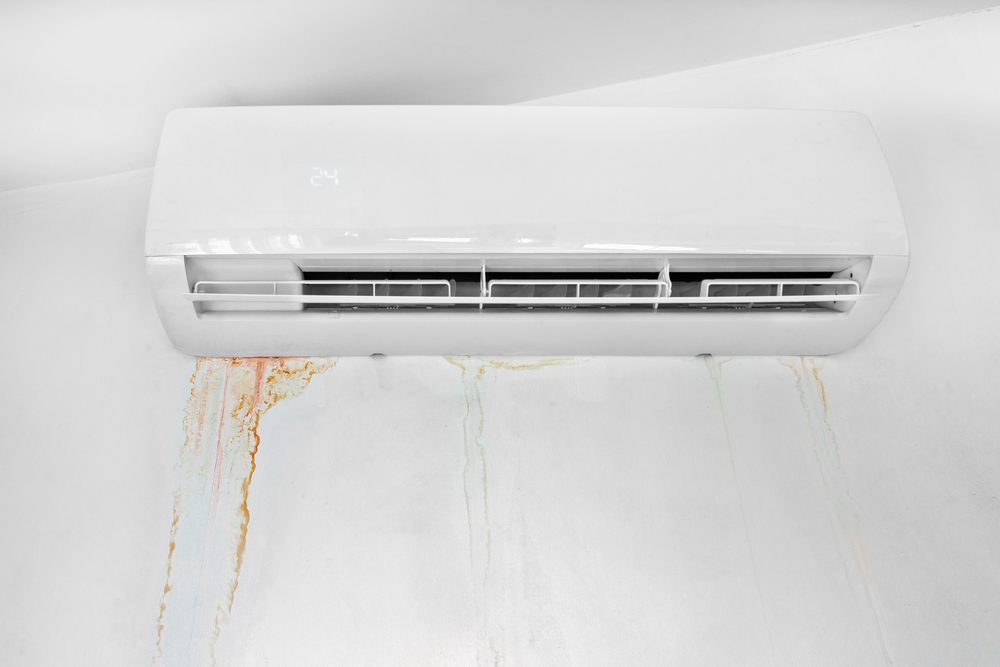We may earn revenue from the products available on this page and participate in affiliate programs. Learn More ›
What You Need to Know
- If your AC smells like vinegar, it could be due to mold in the ducts, condensation buildup within the AC unit, a clogged drain line, dirty filters, or a refrigerant leak.
- In most cases, it’s a good idea to have an HVAC technician inspect the unit to determine the underlying cause of the vinegar smell and make necessary repairs.
- Once repairs are made, if there is any mold growth, it’s best to get in touch with a mold remediation company to ensure the mold is eradicated.
Q: Lately I’ve noticed that my air conditioner smells like vinegar whenever it comes on. What would cause this vinegar smell, and how do I get rid of it?
A: When the temperatures begin to climb, many people rely on air conditioners (ACs) to help keep their homes and vehicles cool and comfortable. But when it smells like there is vinegar in the air conditioner, it can be perplexing, concerning, and frustrating.
Although it’s not always dangerous when an AC smells like vinegar, the distinct odor usually signals an underlying problem. “A vinegar-like smell from your home or car air conditioner could be due to several issues,” says Brad Roberson, president at Aire Serv, a nationwide HVAC repair service. “Common causes include mold growth, a clogged condensate pan, or a refrigerant leak.”
If a home AC smells like vinegar, there are several important things to know about possible causes, how to get rid of the vinegar smell, and when to call one of the best HVAC companies (like One Hour Heating & Air Conditioning or Aire Serv).
1. Mold growth in air ducts can lead to a vinegar smell in the home when the air conditioning is turned on.
Mold in HVAC systems is a common culprit of unusual smells coming from an AC unit. Air ducts are particularly prone to mold due to condensation buildup. When mold spores in the air come into contact with the moisture inside the ducts, the dark and damp conditions are favorable for mold to spread, creating musty or vinegary odors. When the air conditioner powers on, it circulates air through the mold-infested ducts, dispersing the unpleasant vinegar odor throughout the home. In addition to the distinctive vinegar smell in the house, other signs of mold include visible patches of black, green, or white growth around air vents.
Because mold can pose long-term health risks in addition to aggravating allergies or respiratory symptoms, it’s important to conduct regular inspections and cleanings of air ducts. The best air duct cleaning services (like Ductz and Stanley Steemer) can thoroughly remove mold and help homeowners implement measures to prevent future occurrences. In addition, maintaining proper humidity levels and addressing any leaks or condensation issues quickly can help keep the air ducts mold-free. Finally, mold spores in air ducts can easily be circulated throughout the home, so it may be worth having a mold inspection to check the air quality in the home and ensure that it is mold-free. A mold inspection costs $656 on average.

2. Condensation within the AC unit can also lead to fungus, mildew, or mold, all of which may smell like vinegar.
Air conditioners take in warm air from the home and cool it over a series of coils that are cooled with refrigerant. When the warm air comes into contact with the cold surface of the coils, condensation forms. “Oftentimes, especially when they are overtaxed during the summer months, AC units will produce a lot of condensation…[which] can cause mold growth,” explains Bethany Uribe, mold division mitigation supervisor at ASAP Restoration, a restoration company based in Tempe, Arizona. “If that species of mold produces a smell like vinegar, then this can get sucked into the air of the AC system.”
Signs of this problem include visible mold around the condensate drain, water stains near the air handler, and a persistent damp feeling in the air. Homeowners may even notice that their AC system is less effective at cooling and see increases in energy bills.
Regular maintenance of air conditioners is essential to prevent and address mildew growth. HVAC service costs around $100 on average and includes cleaning or replacing air filters, ensuring proper drainage and maintaining optimal humidity levels. If excess condensation and mildew are detected, professional cleaning and servicing of the air conditioning system may be necessary.
3. A clogged drain line can also lead to excess moisture and eventually mold and mildew.
The AC unit’s drain line is a pipe that runs outside the home to remove condensation from the unit’s evaporator coils. When the drain line is blocked, the condensation has no proper outlet and accumulates inside the system. The stagnant water creates an ideal environment for mold and mildew to grow and emit a vinegar-like odor when the AC is running.
It’s a good idea to inspect and clean the drain line if the vinegar smell doesn’t have another obvious source. Ironically, vinegar kills mold and acts as a disinfectant, so a mixture of vinegar and water can flush out the blockage. Regular maintenance of the drain line can help prevent future clogs and moisture buildup.
After the clog in the drain line is addressed and all mold and mildew are removed, the vinegar smell will likely dissipate within a few hours to a few days. If the odor persists, it’s advisable to contact a professional HVAC cleaning service to ensure all traces of mold and mildew are eliminated.
4. If the AC’s air filters haven’t been cleaned or changed recently, they may have become clogged and developed a smelly mold or fungus.
While you may not know how to clean every appliance in your home, cleaning air filters is a high-priority home maintenance task. Air filters naturally become clogged with dust, dirt, and other debris over time, which restricts airflow and makes the AC system work harder. The restricted airflow creates a moist environment that can make the AC smell musty or vinegary from mold and mildew growth.
Clogged air filters not only leave the space smelling of vinegar but also reduce the efficiency of the air conditioner—which can lead to higher energy bills and damage to the system. Homeowners will want to inspect and replace air filters often depending on the AC unit’s usage and environmental factors of the home. “The most important thing a homeowner can do to maintain an HVAC unit is change the filter every 30 to 90 days and have the unit serviced at least annually,” Roberson notes.
Regularly cleaning or replacing filters can prevent the buildup of mold and fungus, ensuring fresh and clean air circulation. To clean an AC filter, turn off the air conditioner and remove the filter. Rinse the filter under running water to remove dust and debris. For a deeper clean, soak the filter in a mixture of warm water and mild detergent for 15 to 20 minutes. Rinse thoroughly and let it dry completely before reinstalling.

5. Refrigerants like Freon can have a chemical smell that is similar to vinegar. A persistent vinegar smell could mean that the unit has a refrigerant leak.
Refrigerants or coolants like Freon are noncombustible gases that work inside AC systems to create cool air. Sometimes refrigerants emit a smell similar to vinegar.
If homeowners notice a persistent vinegar-like odor coming from their AC unit, it could be a sign the refrigerant is leaking. A refrigerant leak not only leads to unpleasant smells but can also cause inadequate cooling.
Homeowners can check the AC refrigerant level by looking for signs such as hissing sounds, reduced cooling performance, and ice buildup on the evaporator coils. Another method is to use a manifold gauge set to measure the refrigerant pressure. However, since the readings can be complex, it’s usually best to consult a professional HVAC technician because of their specialized knowledge.
Unusual smells almost always signal a deeper issue with an AC unit. It’s a good idea to contact an HVAC technician to address the root problem.
If a home or car AC smells like vinegar, adding one of the best air fresheners can temporarily mask unpleasant AC smells. A fabric softener sheet over the air filter or a few drops of essential oils added to the filter can help circulate a pleasant fragrance. However, ignoring the underlying reason why the air conditioner in a car or home smells like vinegar won’t make it go away.
“Ignoring unusual odors from your air conditioning system can lead to more severe damage to other HVAC components and even other areas of your home,” says Roberson. “It’s important to address these smells promptly to avoid costly repairs and potential health risks.”
Contacting an HVAC technician is a good first step for any AC-related problems. HVAC professionals can thoroughly inspect the system (HVAC inspection costs between $250 and $400), diagnose the issue, and correctly perform any necessary repairs. “HVAC systems have sensitive electronic parts, and untrained attempts at repair can cause further damage,” says Roberson.
However, Uribe points out that different root causes may require additional professional interventions. It may be necessary to call one of the best mold removal companies (like ServiceMaster Restore or ServPro). “If the problem is a mold growth issue, the only thing that an HVAC technician will be able to solve is the underlying AC component,” says Uribe.
Although you may be put off by AC repair costs, regular maintenance and timely interventions by a technician can help an AC system operate efficiently, safely, and free of unpleasant odors.


